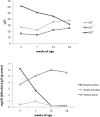Citrin deficiency mimicking mitochondrial depletion syndrome
- PMID: 33176737
- PMCID: PMC7659096
- DOI: 10.1186/s12887-020-02409-x
Citrin deficiency mimicking mitochondrial depletion syndrome
Abstract
Background: Neonatal intrahepatic cholestasis caused by citrin deficiency (CD) is a rare inborn error of metabolism due to variants in the SLC25A13 gene encoding the calcium-binding protein citrin. Citrin is an aspartate-glutamate carrier located within the inner mitochondrial membrane.
Case presentation: We report on two siblings of Romanian-Vietnamese ancestry with citrin deficiency. Patient 1 is a female who presented at age 8 weeks with cholestasis, elevated lactate levels and recurrent severe hypoglycemia. Diagnosis was made by whole exome sequencing and revealed compound heterozygosity for the frameshift variant c.852_855del, p.Met285Profs*2 and a novel deletion c.(69 + 1_70-1)_(212 + 1_231-1)del in SLC25A13. The girl responded well to dietary treatment with a lactose-free, MCT-enriched formula. Her younger brother (Patient 2) was born 1 year later and also found to be carrying the same gene variants. Dietary treatment from birth was able to completely prevent clinical manifestation until his current age of 4.5 months.
Conclusions: As CD is a well-treatable disorder it should be ruled out early in the differential diagnosis of neonatal cholestasis. Due to the combination of hepatopathy, lactic acidosis and recurrent hypoglycemia the clinical presentation of CD may resemble hepatic mitochondrial depletion syndrome.
Keywords: Citrin deficiency; Hypoglycemia; Neonatal cholestasis; Newborn screening; SLC25A13; Urea cycle defect.
Conflict of interest statement
The authors declare that they have no competing interests.
Figures



References
-
- Saheki T, Song Y-Z, et al. Citrin deficiency. In: Adam MP, Ardinger HH, Pagon RA, Wallace SE, Bean LJ, Stephens K, et al., editors. GeneReviews®. Seattle: University of Washington, Seattle; 1993. - PubMed
Publication types
MeSH terms
Substances
Supplementary concepts
LinkOut - more resources
Full Text Sources
Research Materials

